"You may say, it is impossible for a man to become like the Machine. And I would reply, that only the smallest mind strives to comprehend its limits." –Fabricator General Kane
Ever since Gremlin Interactive first released HeroQuest in 1991, Games Workshop has been steadily bulking up its income by licensing regular computer game releases based on its vast (if hollow) lore. But while initial offerings were unique, somewhat intriguing and fun (what with the likes of Space Crusade, Chaos Gate, Dawn of War or Space Marine), 32 years and 106 games down the road, the chances of a Warhammer-licensed game being good usually lean towards the "none" end of slim. Most devs seem happy to use GW's branding as a crutch for poorly designed, badly programmed games — but exceptions do crop up once in a blue moon.
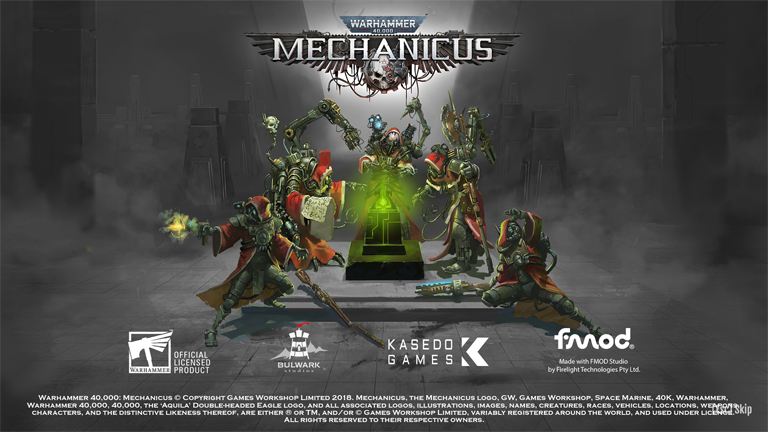
Warhammer 40,000: Mechanicus is testament to the fact.
Made by a small, French outfit called Bulwark Studios, Mechanicus is – at heart – an XCOM clone and anyone who has played either of the two Firaxis titles will find themselves immediately at home with the game's mechanics. What sets it apart, however, is the unique setting, the varied cast, the spooky, atmospheric score, slick graphics, and a surprising amount of customization for such a small production.
In Mechanicus you play a member of the enigmatic tech-sect, the Adeptus Mechanicus, who are sent to a world rumored to house alien technology. A member of your order was dispatched there years ago, but all contact was lost. You are meant to find out what happened and catalogue any new discoveries as befitting an order that sees knowledge as its ultimate pursuit.
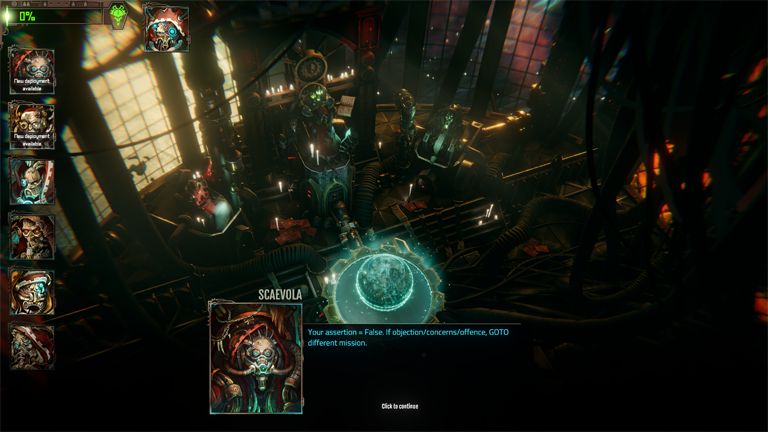
Accompanying you on your trip is your council of seven advisors – other Mechanicus Magi, each with their own personalities and agendas – such as Scaevola, who "sounds" like a talking compiler and values logic and knowledge above all else; Videx, who sees the world through the binary prism of religious fervor; or level-headed Khepra, who leads the Skitarii (Mechanicus infantry) and just wants her men to stay in one piece for as long as possible.
Opposing you are the wholly-mechanical (no corruptible flesh here, thanks!) Necron: machines infused with the souls of a long-forgotten race. The planet you landed on is one giant Necron tomb, you see, and its occupants are in the process of awakening from centuries-long slumber.
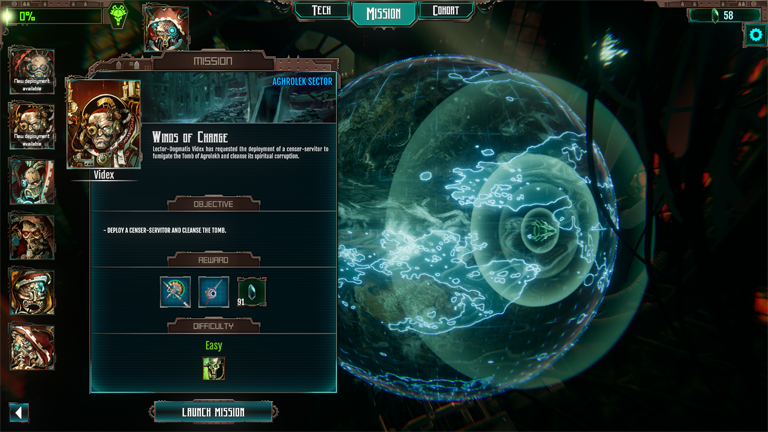
The Magi dispense missions on the planet, each with a particular goal and reward. Completed missions move a timer forward and the game ends when you either complete all missions or the timer runs out (and the Necron army wakes up — grumpy).
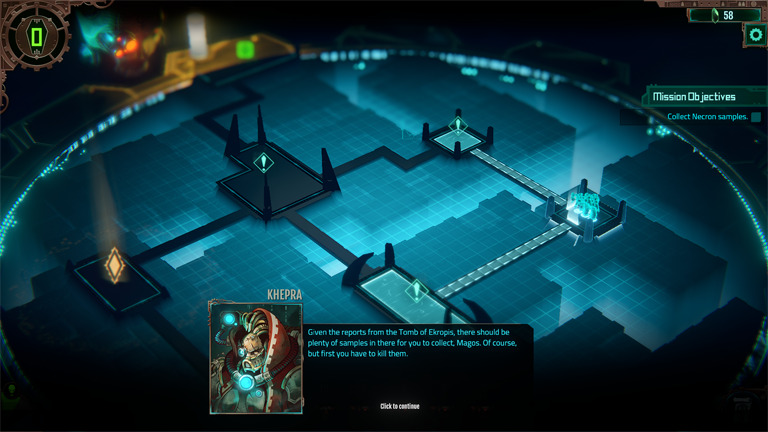
Missions span individual tombs composed of rooms. You move your party from room to room – experiencing "events" (little text vignettes that offer you a few choices, each with immediate, tangible consequences) – until you find your way to a battle. Once in battle mode, the game shows its true, XCOM heritage and switches to turn-based, isometric pew-pew.
While, in the beginning, your squad will mostly be composed of Servitors (5 HP drones with a single melee attack), by the end you can collect an impressive roster of varied units such as Skitarii Vanguards and Rangers, Sicarian Infiltrators or the hulking Kastelan Robots. But your best, most useful units are the Techpriests, who can be upgraded and customized to your liking.
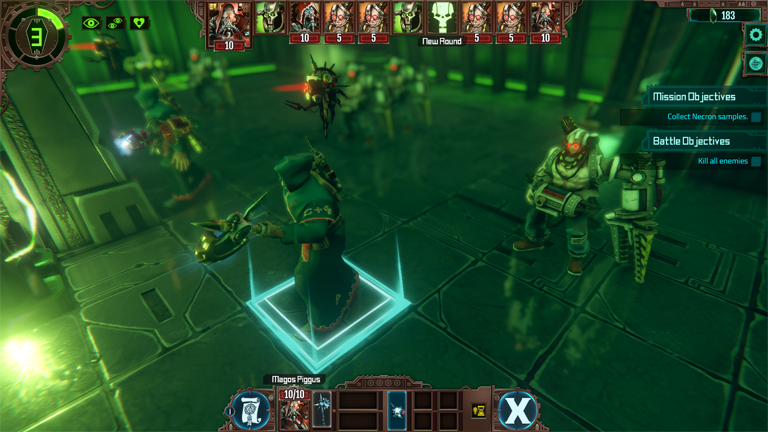
For them, the game offers seven disciplines (classes) and 11 (!) equipment and weapon slots. A fledgling Techpriest may only be slightly more useful than a Servitor, but a fully leveled one can defeat multiple enemies single-handedly without much effort. Towards the end of the game, the Techpriests are a force to be reckoned with – but also almost as devoid of humanity as the very forces they are trying to defeat.
That's the aspect of the game I liked the most, really. At their core, the Mechanicus priests and Necrons differ only in ideology. Both are obsessed with augmentation and see their biological components as weaknesses. It's almost as if you (the player) were witnessing the final stage of a race's evolution do battle with its own progenitors.
Another fun detail that Bulwark managed to bring to the forefront was the fragmented nature of the Adeptus Mechanicus faction. Usually, in W40K "plots", the disparate sides of a conflict differ largely by their uniforms, with homogenized attitudes and boilerplate responses. The bad guys are all "rah, rah Chaos!", the good guys – "rah, rah, Emperor!" – and the tone of discourse is on par for a Saturday morning cartoon (are those still a thing?). Among the Magi, however, (perhaps as befitting academics) every outlook is different and argument prevails (and I mean a lot of it) – especially between Scaevola and Videx, who are at polar opposites of opinion where alien technology is concerned.
While Warhammer 40,000: Mechanicus is neither long or overly complex, it makes for a pleasant play, a fun experience and a firm reminder that licensed material alone a good game does not make. If you like the W40K franchise, XCOM-like tactical gameplay or just feel too at ease with relatable characters in the games you play – give Mechanicus a go. It might just be an XCOM clone underneath, but the surface treatment is as unique and well-constructed as they come.
Pig Recommends:
- Dawn of War – for great W40K tactical gameplay, try this Relic Entertainment gem; with Winter Assault and Dark Crusade installed (but not Soulstorm: say no to shoddy models and ruined game balance!), DoW gives you seven factions to play around with, one great campaign (WA), one so-so one (DoW) and one unique sandbox (DC) – all with LAN coop; best of all, even in battles counting hundreds of units the game runs smooth as silk (one of the last patches Relic put out optimized Dark Crusade better than any game I've seen — before or since);
